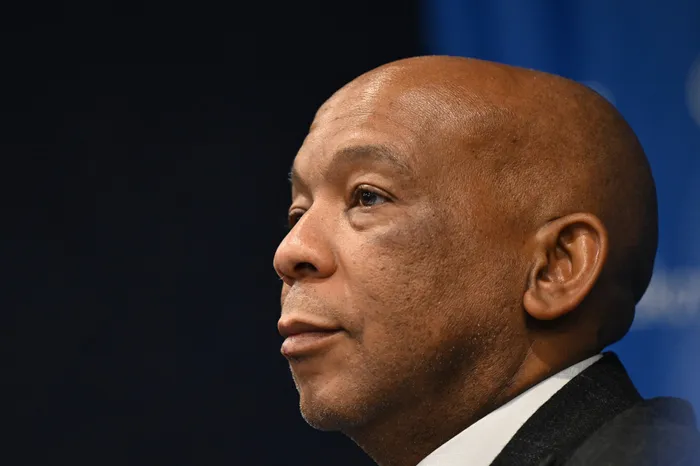
Electricity Minister Kgoshientsho Ramokgopa confirmed plans to appoint a new board of Necsa within three weeks, remarking that recent events within Necsa indicated a concerning trend where board members prioritised salary discussions over critical strategic issues that affect the mandate of the organisation.
Image: Henk Kruger/Independent Newspapers
The outgoing chairperson of the South African Nuclear Energy Corporation (Necsa), David Nicholls, has backed Electricity and Energy Minister Kgosientsho Ramokgopa’s decision to dissolve the entity’s troubled board and appoint a new one, following a string of resignations and disputes over executive pay.
Appearing before Parliament’s Portfolio Committee on Electricity and Energy on Friday, Ramokgopa confirmed plans to appoint a new board within three weeks.
Ramokgopa remarked that recent events within Necsa indicated a concerning trend where board members prioritised salary discussions over critical strategic issues that affect the mandate of the organisation.
The board had disintegrated because of controversy surrounding the increase in CEO Loyiso Tyabashe's salary. Some board members had raised questions about the way salary increases had been implemented by Tybashe, resulting in an internal audit being instituted.
The audit reportedly raised concerns whether the board had been provided with accurate financial information by the executives when seeking to prove there was sufficient budget for the increases.
When the board sought to place Tybashe on precautionary suspension, he opposed the action legally while Nicholls refused to sign the notice and tendered his resignation, which Ramokgopa vetoed.
Speaking to Business Report on Sunday, Nicholls said Ramokgopa had acted appropriately in deciding on taking new appointments entirely because filling in the gaps would still have required the appointment of a new board in a few months when the term from January 2021 expires.
Nicholls confirmed that some board members had become far too preoccupied with the administrative issues of the entity rather than policy.
On the allegations of Tyabashe's salary increase, Nicholls said it had been explicitly approved by the board and that the subsequent move to fire the CEO did not meet his approval, hence he declined endorsing it and tendered his own resignation.
"It was the Minister's call and it was absolutely appropriate. It makes sense to me for the Minister to appoint a new board because the term was expiring in January next year," Nicholls said.
"So the choice was to either replace a few board members or appoint a new board. And yes, I would still be willing to serve if the Minister called on me to do so. The approach of some board members to the executive was not to my approval."
Further adding to the discontent at Necsa, Ramokgopa noted that the board had failed to possess adequate scientific competencies.
"They had spent the majority of the year just meeting and not discussing strategic issues. They were meeting to discuss issues of salary of the CEO until they arrived at that determination," Ramokgopa said.
"There's no other way of explaining it other than people not being confident of their ability to substantiate why they've taken a decision that they've taken. So if you look at the profile of the board, you have a board that is charged with running one of the three active reactors in the country with only one member of the board who has the knowledge of the nuclear industry, that being the chairperson of the board.
"The board that's going to be appointed is going to have the presence of scientists, people who are going to help us to steer this in the right direction."
Ramokgopa also confirmed the launch of investigations into allegations by a whistleblower that Nicholls and Tyabashe were too close despite there being no issue with their joint employment at Eskom about 20 years ago, and that the nature of their positions at Necsa required close interaction.
BUSINESS REPORT